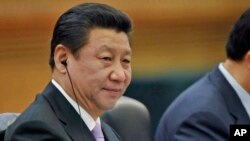When Chinese President Xi Jinping visits Pakistan for two days next week, investment in the infrastructure and energy sectors are likely to top the agenda.
Xi was originally scheduled to visit Pakistan last September, but China cancelled the trip because Pakistan was in the grip of major anti-government street protests.
Pakistan’s Foreign Office announced Thursday that the Chinese president will be in Islamabad on April 20 and 21.
"He will be accompanied by a high-powered delegation," Pakistan foreign ministry spokeswoman Tasneem Aslam told a press briefing in Islamabad. She gave no other other details but said a number of important agreements and memorandums of understanding will be signed between the two countries during the visit.
China has been a key financial and military ally of Pakistan over the years, and Pakistani Prime Minister Nawaz Sharif secured promises of $42 billion worth of investment when he went to Beijing in November last year.
Pakistan-China Corridor
Xi's trip is expected to focus on the Pakistan-China Economic Corridor, a planned $46-billion network of roads, railways and energy projects linking Pakistan's deepwater Gwadar port in the Balochistan province of Pakistan on the Arabian Sea with China's far-western Xinjiang region.
Balochistan shares a border with Iran and Afghanistan, and despite its shoreline and natural resources, remains the most backward province in the country. Some economic experts believe that the development of the economic corridor will not only greatly benefit Balochistan, but it will also serve the whole country’s economic interests.
“The planned corridor, I would say an Industrial corridor, is going to be a trade-hub for the region and other SARC [South Asian] countries," Mian Abrar Ahmad, an industrialist and former chairman of the Karachi Chamber of Commerce and Industry, told VOA's Urdu Service.
Abrar said "Pakistan and Balochistan are lucky to have this opportunity."
"If international powers do not intervene," he added, "this corridor, in my opinion, has positive impacts for people not only in Pakistan but people in Central Asian Nations and beyond.”
Some other economic experts believe it is customary to make big announcements during such high-profile visits, but it is not necessary that all of them materialize.
“There is a lot of space between promises and implementation," Mehtab Haider, an expert on economic affairs, told VOA's Deewa Radio. "I would like to see if all the money pledged comes to Pakistan and also how well the host government plans to use these funds.”
Xi is also likely to address fears that Muslim separatists from China's Xinjiang province are linking up with Pakistani militants, and he could also push for greater efforts to create a more stable Afghanistan.




